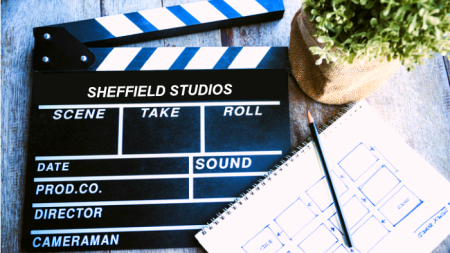
Falling behind schedule during any audio video production is a director’s worst nightmare. From the sun setting before you’ve had time to finish shooting a particular scene to rain delaying production by a day (or more!), time is literally money and a slight delay can have a huge impact on your production budget.
However, as someone who is in the beginning stages of a video production career, you may not know the trouble that lies ahead when overtime on set becomes a reality.
To maximize profitability and quality, as well as provide timely audio video services to your Baltimore clients, it’s important to have some efficiency tips up your sleeves ‒ tips that most books won’t tell you, but we will!
Today we will share with you some of the top tips for keeping your production in line and avoiding some major pitfalls that a little insider’s knowledge could have prevented.
Why is Efficiency So Important for Audio Video Production?
If you attended your favorite audio video school in Baltimore, you probably already know that efficiency in all areas of life is important. Further, it is a particularly crucial skill on-set during a video production.
Here are just some of the reasons why efficiency will benefit your production:
- Reduced labor costs by eliminating wasted time
- Reduced inventory costs since every piece of equipment needs to be on-hand and ready to go
- Optimized equipment use (everything works, is compatible, and available to use)
- Improved on-time deliveries of any needed products or services
No one involved in a video production wants to cut things short and sacrifice quality due to time constraints. And no one wants to pay the hefty overage fees associated with going over the scheduled time.
While it is impossible to avoid this at all times, there are plenty of things you and your team can do to keep the day moving forward smoothly.
Pre-Production Planning
Pre-planning your production day is crucial to staying on track. Here are some things The Sheffield Institute for the Recording Arts will teach you so you can stay ahead of schedule.
Storyboards
Developed in the early 1930s by Walt Disney, storyboards are a time-consuming yet effective method for maintaining a smooth production day.
Storyboards are hand drawn or digitally created timelines of the entire production process. They lay the foundation for each shot that is on the schedule and provide the entire team a visual of how the production process will play out. They will include things such as camera angles, placement of people and props, lighting effects, and the motion of production.
Storyboarding allows everyone to come together and brainstorm the plan for the day, fosters creativity, and helps to get everyone on the same page so there are no misunderstandings about things such as camera placement, three point lighting techniques, audio, and special effects.
Shot Lists
Directly related to storyboards are the shot lists. Shots are considered uninterrupted sequences of frames taken by a video camera. In the post-production process, all of these shots will be combined and edited to produce the final product.
A shot list is simply a to-do list of sorts that sets up each shot that is on the schedule for the day. Rather than shoot the video chronologically, each shot will be set up based on set and location to prevent bottlenecking, continual costume changes, and all around chaos.
This list can easily be distributed the entire audio video production crew prior to filming so everyone knows at all times where they need to be and what they need to be doing.
Set Check
Checking the production set before any shooting occurs can ward off a lot of problems that can slow down your day significantly.
Have a qualified AV technician scrutinize the entire production stage for set mistakes, missing equipment, faulty wiring, poorly lit locations, and more. By having your AV technician sign off that everything is in its place before any shooting takes place, your production day will be that much more efficient.
The Morning of Production
First thing in the morning everyone is fresh and ready to work. There is excitement about the day and the thought that anything could go wrong is far from anyone’s mind.
But don’t let that fool you.
In an ideal world everything will go according to your pre-planned storyboards and shot lists. But the truth is, time is ticking the minute you step foot on set and things can get off track easily. While not all problems can be anticipated, one great tip for setting the mood right and encouraging a hustle in everyone’s step is to get the first shot done within the first hour of being on set.
Lunch Time
If you have a long day of video production ahead of you, no doubt it is important to give everyone a break to clear their mind and eat. This break will energize everyone involved and make things better s you roll into the evening.
That said, one thing a lot of people in the audio video production industry don’t share with those just starting out is how fast time can slip by when taking a break(!). Solve this by offering just enough time to rest and eat, and give your production team a specific time at which production will resume.
Also, although tempting, don’t start talking about the morning’s footage. By doing so, you could easily lose an hour or more of production time without realizing it. Leave the editing to the time allotted for the editing phase. For now, focus on getting an energy boost and finishing your day strong.
At Sheffield, we will teach you the importance of the entire production process. Not only will you learn the proper order that each production phase should be completed, but we also cover the realistic details and considerations you will need to plan for to achieve your perfect production. Education like this is invaluable for when you step foot into the production industry because learning on the job is not always the most helpful for creating a good first impression with clients.
The End of the Day
Focusing on the production process for an entire day is no easy task, even for someone as experienced as a director. In order to make it to the end of the day without going into overtime, it is a good idea to have someone on hand to coordinate the day’s activities right up until the end of the day.
Hiring a solid assistant director is not always something directors want to do. Relinquishing control may be tough for some directors; yet handling it all at once is almost impossible and is a recipe for disaster.
If you are the director of your production team – kudos to you, you have really made it and Sheffield has taught you well! However, don’t let pride get in the way. Hire someone you can trust to be in charge of the day’s production schedule; someone who can take charge and direct everyone to their assigned spots on time, every time. That way, come end of day, you can wrap up and leave as scheduled without having to worry about overtime or an unfinished production.
If you are just starting out in the audio video production industry, take the advice mentioned above. It will help you your entire career no matter how successful you become. In fact, following tips like these may be the reason you become so successful.
For those who want to join the students interested in providing audio video production services in Baltimore, consider contacting The Sheffield Institute for the Recording Arts. In addition to the thorough textbook information and hands-on training we provide, our industry experts will also provide insight into what it’s really like to work in the audio video production industry.
In the real world, production problems happen. At Sheffield, you are equipped with the expertise to solve them.



